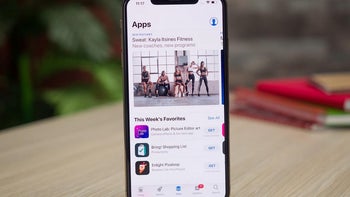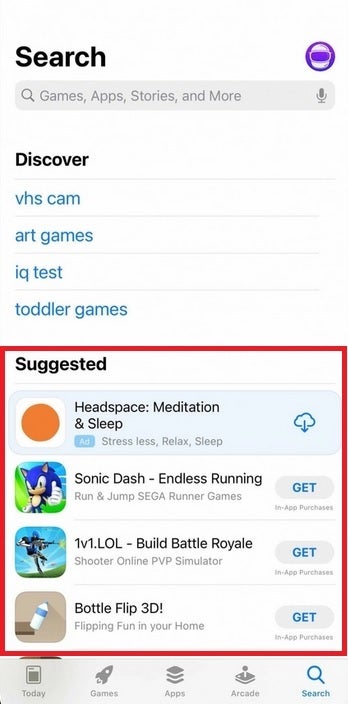Apple tests a new location for ads in the App Store

Besides allowing mask-wearing Apple iPhone users with an Apple Watch to unlock their handset without using a Passcode or Face ID, the iOS 14.5 beta has something else new. In an attempt to make some more money from the App Store (beyond Apple's 30% cut of in-app revenue), Apple is placing ads on the App Store's Search tab. According to 9to5Mac, the advertised app is listed as a suggested one for iPhone users to install.
Keep in mind that since this is showing up only on the iOS 14.5 beta, there is a chance that it won't be kept for the final version of the build. In that case, things would revert to how they used to work now with ads appearing only when advertisers bid on certain keywords. If Apple does keep the new feature, the ads appear before any type of keyword to search for is typed in by the user. It could be that Apple is using the beta period to collect important stats on how often users engage with the ads in this particular slot in order to decide whether to keep the ads in that location.
The money generated by the ads will be included as part of Apple's Services unit, its largest division by revenue. This group includes AppleCare+, iCloud, the App Store, Apple Music, Fitness+, Apple Arcade, Apple TV+, Apple News+, Apple One, Apple Pay, and more. Last year, the Services unit grossed $53.77 billion allowing Apple to meet and beat a goal to achieve $50 billion in revenue for the division by fiscal year 2020.

With the iOS 14.5 beta, ads will appear in the App Store on the Search tab under the heading Suggested
Apple Store search ads started in 2016. And Apple has started including ads for its Services features in the Settings app. This has upset many iPhone users who point out that they are paying over $1,000 for their phones in many cases and shouldn't be subject to receiving ads designed to make Apple more money. But Apple likes to promote how it keeps iOS users' data private. Soon, Apple's App Tracking Transparency feature will demand that iOS users opt-in if they want to be tracked for advertising purposes. The average mobile app has six trackers that send user data to other apps. While most iPhone users are expected not to opt-in to be tracked, there are some who like the convenience of having ads for what they are shopping for found online.
Facebook and Snapchat are believed to be the two apps most affected by Apple's App Tracking Transparency (ATT) feature. Months ago, Facebook said that Apple's moves could lead to a 50% drop in ad revenue for the year which would be an annual hit of more than $40 billion. A more recent analysis calls for quarterly declines of 2.11% to 13.59% for the second quarter of this year, when Apple's ATT is expected to debut to all iOS 14 users. World-wide, in the best case scenario, this analysis sees 30% of Facebook users on iOS opting-in to be tracked, and only 10% in the worst case scenario.










Things that are NOT allowed: